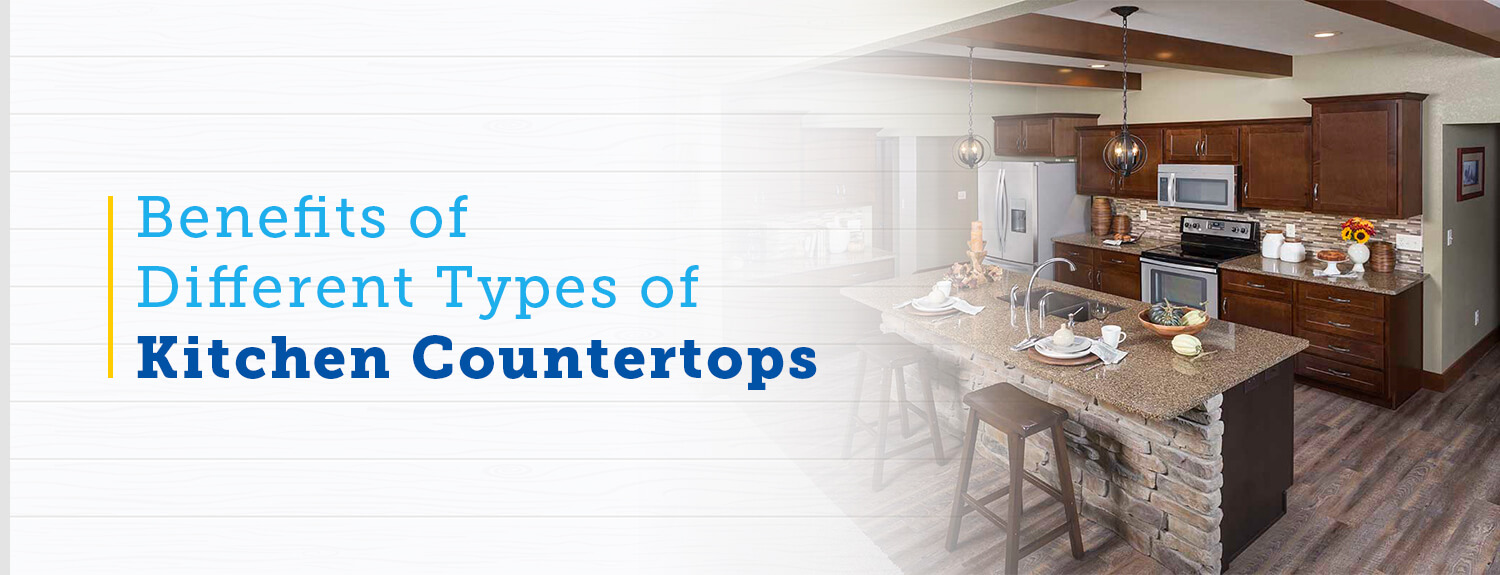Benefits of Different Types of Kitchen Countertops
Your countertop is a key aspect of your kitchen’s design and style, so choosing the right type of material is essential. If you’re renovating your kitchen or building your home from scratch and wondering how to choose countertop material, then this insightful guide is here to help. You’ll want to consider different types of materials for your countertops based on factors such as lifestyle, preference and your home’s design. Different types of countertops include:
- Wood
- Granite
- Solid surface
- Quartz
- Engineered stone
- Tile
Below, we break down the different types of kitchen countertops as well as a few pros and cons of each to help guide you in your decision-making process and choose the right countertop for you.
Wood Countertops
Also known as butcher block counters, wood countertops are surging in popularity amongst homeowners and building professionals. Wood is one of the most durable kitchen countertop materials. You can choose from different types of wood including:
- Birch
- Walnut
- Cherry
- Hard maple
- White oak
The type of wood you choose influences the color, graining and durability of your kitchen countertops. When choosing the right type of wood, you’ll want to consider how you plan to use your counters. For example, if you’re planning to cut, chop or prep foods directly on your wooden counter, then you’ll want a softer or medium hardness type of wood such as hard maple. Likewise, a harder wood such as Brazilian cherry is ideal if you aren’t planning to use your kitchen countertops for preparing food or meals. If you’re thinking about using wood for your kitchen countertops, then here are some pros and cons to consider.
Pros of Wood Countertops
Wood countertops offer several advantages beyond the ability to cut, chop and prepare foods directly on their surface including:
- Rustic charm: The look of wood countertops for your kitchen adds a rustic charm to your home. If your home is designed using natural earth tones and wood grains, then choosing wood for your kitchen countertops is likely going to complement those design features.
- Customization options: The different types of wood available on the market offer you several customization options. You can customize your countertops with different patterns and even incorporate other types of materials into your design.
- Warmth: Compared to marble, stone or other hard building materials, wood countertops are warm to the touch and hold heat. This makes them more inviting and creates a cozy kitchen environment.
- Durability: Wood countertops are a durable option for your kitchen. They aren’t prone to breaking, cracking or fading, which makes them one of the more durable materials for your counters. Couple this with the ability to prep food directly on their surface and wood countertops are a smart option for homeowners and building professionals.
Cons of Wood Countertops
As great as wood countertops are, they’re not an ideal option for all homes, and there are cons associated with choosing wood including:
- High maintenance: Wood countertops are high maintenance as they require care and attention to keep them looking new and functioning properly. You’ll need to perform regular maintenance on your wood countertops such as oiling and resealing them routinely. Most household cleaners and chemicals are not compatible with wood countertops as they can damage the finish plus create fading or discoloring. If you don’t have the time or energy to put into regular maintenance, then wood countertops may not be the best choice for your kitchen.
- Sensitivity to moisture and climate: Wood is sensitive to extreme climate conditions that can cause warping and bowing. Climates prone to high levels of heat, humidity and moisture aren’t ideal for wood countertops.
- Dents and scratches: Your wood countertops are susceptible to damage from dents and scratches. If you’re using your wood countertops for cutting, chopping and prepping food, then you’ll want to be wary of scratching and denting the surface.
- Mold and bacteria: Wood countertops offer natural antibacterial properties, but the scratches and knife marks from prepping food can harbor mold and bacteria. You’ll want to clean and disinfect your wood countertops immediately after using them to prepare food to prevent harmful mold or bacteria from growing out of control.
Granite Countertops
Granite has long been a popular choice for countertops due to its natural charm and versatile capabilities. Granite is a form of igneous rock harvested from the earth using explosives and machinery to remove it from the ground. Granite is comprised of different minerals and can include quartz, mica and feldspar, which in turn determines the color. Granite can be red, pink, brown, grey or white, making it a unique kitchen countertop material. Once granite is harvested from the earth, it is cut into slabs and polished to transform it into a building material used in fireplace mantles, floor tiles and countertops.
Granite countertops have several pros and cons associated with them that you need to consider when thinking about your kitchen’s design and function.
Pros of Granite Countertops
Granite is an ideal material for creating durable kitchen countertops as it’s low-maintenance and resists damage from heat and moisture. Other pros of granite countertops include:
- Versatile: The minerals that comprise granite create a variety of colors and patterns that make it a versatile option for your kitchen countertops. Granite can be used for other areas around your home such as your floors and fireplace, making it an adaptable building material.
- Customizable: The wide range of colors and patterns also makes granite an ideal material if you want to customize your kitchen countertops to create a unique design and look.
- Natural: Granite is a natural and organic building material that’s harvested from the earth. If your home features other natural materials and tones, then granite will complement that design and style.
- Heat, stain and scratch-resistant: Granite’s hard natural surface makes it ideal for high-use kitchen countertops as it is resistant to heat from pots and pans as well as scratches from utensils and cutlery.
Cons of Granite Countertops
There are cons associated with choosing granite for your kitchen countertops including:
- Outdated: The dark colors of granite slabs are becoming outdated and are no longer fashionable. Today’s modern kitchens feature light colors and bright schemes, causing granite to be phased out by many kitchen design experts.
- Shows seams between slabs: When construction professionals install granite slabs for your kitchen countertops, the seams between the slabs are tough to conceal.
- Needs to be resealed: Granite countertops are sealed into place and over time require resealing to keep your counters looking like new. You’ll want to account for this when choosing countertop materials.
- Cracks and fading: Granite slabs are also prone to fading from the effects of direct sunlight or indoor fluorescent lighting. Granite is also prone to cracking, so you’ll need to take caution when placing heavy items on your countertops.
Solid Surface Countertops
Solid surface countertops have been in the marketplace for around 50 years and were developed as an alternative to granite and other natural stone countertops. Solid surface countertops are man-made options built from acrylics and other resins that have been pressed together to create countertop slabs. Solid surface countertops can be made to look like other materials including marble and granite.
Pros of Solid Surface Countertops
Solid surface countertops are a great option for mid-tier kitchen designs with a need to cover ample counter space. There are many benefits associated with solid surface countertops including:
- Invisible seams: Unlike granite, the seams between the slabs of solid surface countertops are easily disguised and can be installed in a way that makes them virtually invisible.
- Resists stains: Solid surface countertops resist stains from liquids and other fluids used in cooking and baking. Their non-porous surfaces don’t allow stains to seep into the grain.
- Versatile: Solid surface countertops are a versatile option for your kitchen design and style as they can be fabricated to look like other materials such as granite, marble or quartz.
- Easily repaired: Scratches, dents and chips are easily repaired by sanding and painting your solid surface countertop.
Cons of Solid Surface Countertops
Solid surface countertops are a great option for your kitchen counters, but they may not be right for everyone. Some of the cons associated with solid surface countertops include:
- Not heat resistant: Solid surface coutntertops are not heat resistant. A solid surface countertop is easily damaged, burned or scorched from hot pans or baking sheets.
- Susceptible to scratches: Solid surface countertops are easily scratched and damaged. Although this can be fixed by sanding and painting, you’ll want to consider lifestyle and usage before installing a solid surface countertop.
- Must be fabricated: Solid surface countertops must be fabricated and installed by a professional.
- Damaged by chemicals: Solid surface countertops can be easily damaged by household cleaners and other chemicals such as nail polish remover.
Quartz Countertops
Quartz is a natural mineral found in the earth and it is comprised of oxygen and silicon. Quartz is said to be the most abundant mineral on earth and it makes for a quality, durable kitchen countertop. To create quartz countertops, manufacturers grind the mineral into dust before mixing it with other synthetic materials such as polymers and resins to produce countertop slabs.
Pros of Quartz Countertops
Quartz countertops are becoming a popular option for homeowners looking to create a sturdy and durable kitchen countertop. Some of the pros associated with quartz countertops include:
- Durable: The natural composition of quartz countertops combined with the man-made elements that go into the production and manufacturing process all help create a durable, strong kitchen countertop material.
- Design: Since quartz countertops are manufactured using a combination or natural minerals and man-made materials, then quartz countertops are designed in a variety of colors, patterns and styles that give homeowners an abundance of options when creating the kitchen of their dreams.
- Warranties: Many quartz countertop manufacturers offer warranties on their products. This is rare in the countertop production industry, so you will want to consult with your building and construction professional before assuming your quartz countertop is covered under a warranty.
- Low maintenance: The solid, non-porous design of quartz countertops makes them a great option for those of you looking for low-maintenance options.
Cons of Quartz Countertops
Quartz is a great kitchen countertop material, but like all materials, may not be the best choice for everyone. Some of the cons associated with quartz countertops include:
- Price: Quartz slabs are an expensive option for homeowners on a budget. Quartz countertops tend to be more expensive than marble or granite, depending on the current market. You’ll also have to factor in the cost of installation and extra labor such as cutouts for your kitchen appliances.
- Tedious installation: Installing quartz countertops is also expensive. Installation professionals must take extra care not to drop or crack quartz slabs, meaning skilled professionals must be in charge of installation.
- Sensitivity to UV light: Quartz countertops are sensitive to UV light and can be damaged or discolored if they’re exposed to extraordinary amounts of sunlight. When a quartz countertop is exposed to sunlight for prolonged periods, it can develop a yellowish tint and ruin your kitchen design.
- Susceptible to heat: Quartz is susceptible to damage and discoloring from hot pans and baking sheets. Although quartz countertops can withstand high temperatures, some are very susceptible to damage and discoloring due to exposure to heat.
Engineered Stone Countertops
Engineered stone countertops offer many benefits and are a great option for your kitchen. They offer a look that’s similar to granite and quartz countertops without the hassle of natural stone surfaces. Engineered stone is manufactured using a combination of quartz, granite and other natural minerals mixed with polymers and resins to create engineered stone slabs. Engineered stone slabs are comprised of approximately 93% stone and 7% epoxies, polymers and resins.
Pros of Engineered Stone Countertops
Engineered stone countertops have many benefits associated with them including:
- Non-porous: Engineered stone countertops are manufactured using a combination of natural minerals, polymers, epoxies and resins to create a non-porous surface. The non-porous surface makes engineered stone countertops less susceptible to damage from heat and stains.
- Affordable: Engineered stone countertops are an affordable option for homeowners on a budget. They are a mid-range countertop material, making them one of the more attractive types of counters.
- Heat and stain resistant: The non-porous surface of engineered stone countertops makes them resistant to damage from heat and stains.
Cons of Engineered Stone Countertops
Engineered stone countertops have their drawbacks and are not always the best choice for all homeowners. You’ll want to consider some of the cons associated with engineered stone countertops including:
- Uniform designs: Engineered stone countertops tend to lack pizzaz, bright colors and unique designs. You’ll wanto to consider your design needs and overall style before choosing engineered stone for your countertops.
- Difficult to repair: Engineered stone countertops are durable, yet still susceptible to damage and cracking if they aren’t maintained properly. If damages or cracking happens, engineered stone surfaces are tough to repair and you may have to replace your entire countertop to fix any issues.
- Cold to the touch: Similar to other natural stone surfaces such as granite and quartz countertops, engineered stone is cold to the touch. If you’re looking for a warm surface, then you may want to consider this before choosing engineered stone for your kitchen countertop material.
Tile Countertops
Tile countertops are not as popular as they once were, but they are still a viable type of countertop for homeowners to consider. Tile countertops are installed on top of an already existing surface typically made of wood or particle board using an epoxy to hold the tiles in place. Tile are usually made of ceramic and can be custom made or purchased in bulk from nearly any home improvement or hardware store, but installation should be performed by a skilled and licensed professional contractor.
Pros of Tile Countertops
There are several benefits to choosing tile for your countertop material including:
- Easy to clean: Tile countertops are easy to clean and keep looking new. Ceramic tiles can be cleaned using most any household cleaner or chemical without damaging or discoloring your countertops.
- Typically affordable: Tiles are typically affordable and can be bought in bulk from most any hardware or home improvement store. Of course this depends on the style and design you’re going for in your kitchen.
- Endless design options: Tiles come in a wide variety of shapes, colors and styles. They can be made to closely resemble other types of materials such as wood and marble. This gives you an endless design options for your kitchen countertops.
- Adds texture: Installing tile countertops adds texture to your kitchen and can complement existing designs and patterns. Tile countertops can add character and a unique style to your home.
Cons of Tile Countertops
Tile countertops have their drawbacks as well, though. You’ll want to to consider these cons associated with tile countertops including:
- Cracking: Ceramic tiles are prone to cracking, chipping and breaking from normal wear. Placing heavy objects or simply dropping a solid object on your tile countertops can cause your tiles to break, leaving you with repairs.
- Grout is hard to clean: Although tiles themselves are easy to clean and maintain, the grout used to contain tiles is another story. Grout is hard to clean and can harbor mold and bacteria.
- Custom tiles are expensive: Standard bulk tiles are an affordable option, but if you go with a more unique design for your kitchen tiles, then those can be pricey.
Contact Limitless Renovations For Your Kitchen Countertop Project
Are you in the process of remodeling your kitchen or building the house of your dreams? The professionals at Limitless Renovations are licensed and certified to tackle all of your kitchen construction needs.
Our dedication to quality, integrity and craftsmanship make us the clear choice for all of your home improvement and construction projects. For over 15 years, Limitless Renovations has been proudly serving the homeowners of Atlanta and the surrounding areas. Our professionalism, resourcefulness and meticulous attention to detail have helped us transform hundreds of homes just like yours.
Don’t trust your kitchen countertop project to just anyone. Contact the professionals at Limitless Renovations for all of your home improvement projects today!






